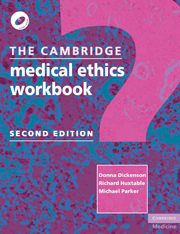Book contents
- Frontmatter
- Contents
- List of cases
- List of papers
- Preface to the second edition
- Preface to the first edition
- Cases in medical ethics and law: an interactive tutorial
- 1 Death and dying: decisions at the end of life
- 2 Reproduction: decisions at the start of life
- 3 Genetics: information, access and ownership
- 4 Medical research: participation and protection
- 5 Mental health: consent, competence and caring
- 6 Long-term care: autonomy, ageing and dependence
- 7 Children and young people: conflicting responsibilities
- 8 Resource allocation: justice, markets and rationing
- 9 Thinking about ethics: autonomy and patient choice
- Appendix 1 Study guide for teachers
- Appendix 2 Using keywords to explore this book
- Bibliography
- Index
- References
2 - Reproduction: decisions at the start of life
- Frontmatter
- Contents
- List of cases
- List of papers
- Preface to the second edition
- Preface to the first edition
- Cases in medical ethics and law: an interactive tutorial
- 1 Death and dying: decisions at the end of life
- 2 Reproduction: decisions at the start of life
- 3 Genetics: information, access and ownership
- 4 Medical research: participation and protection
- 5 Mental health: consent, competence and caring
- 6 Long-term care: autonomy, ageing and dependence
- 7 Children and young people: conflicting responsibilities
- 8 Resource allocation: justice, markets and rationing
- 9 Thinking about ethics: autonomy and patient choice
- Appendix 1 Study guide for teachers
- Appendix 2 Using keywords to explore this book
- Bibliography
- Index
- References
Summary
Introduction
Of all the issues in medical ethics, probably none is more frequently in the news than reproductive ethics – construed broadly to include such controversial issues as: abortion and selective termination of pregnancy; sale and donation of gametes (sperm and eggs); surrogacy or contract motherhood; ‘therapeutic’ and reproductive cloning; non-consensual use of gametes and embryos; rights for children born as a result of sperm or egg donation to trace their genetic parents; sterilization of young people with learning disability or physical handicaps; enforced caesarean sections; ‘designer babies’ (the use of preimplantation genetic diagnosis for social rather than therapeutic purposes, such as sex selection for which there is no clinical need, (e.g. not involving a sex-related genetic condition); egg freezing and other uses of in vitro fertilization (IVF) to allow women to have children after the normal age of child-bearing; the commercial market in private banking of umbilical cord blood for the child's later use; ‘reproductive tourism’, in which people travel to other countries to obtain reproductive tests or services unavailable in their own nations.
In writing a chapter about reproductive ethics, we have thus faced a dilemma about which of the vast range of issues to include, using our criterion of direct clinical relevance to everyday practice. This chapter therefore omits some issues, such as cloning and surrogacy, which at the time of writing were unlikely to be encountered in the course of ordinary practice.
- Type
- Chapter
- Information
- The Cambridge Medical Ethics Workbook , pp. 33 - 56Publisher: Cambridge University PressPrint publication year: 2010



